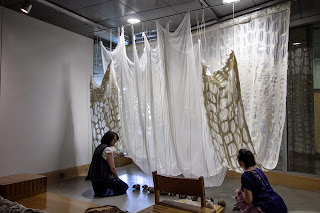The Weekly Volcano, Nov. 7, 2013
Janice
Arnold’s Palace Yurt at the Smithsonian in 2009 was a contemporary take on
ancient Mongolian palace yurts. Designed specifically for the Cooper-Hewitt
National Design Museum’s 2009 Fashioning Felt exhibition in New York, it was
made to fit the arched ceiling of the museum’s conservatory and filled the
space like air in a balloon with elegantly crafted and draped sheets of
handmade felt. Now Arnold has reconfigured the installation for the art gallery
at The Evergreen State College. Working slowly with a team of assistants, it
took Arnold most of the summer while the gallery was closed to complete the
installation, which is one of the best gallery shows ever presented in that
space.
Her
Palace Yurt: Deconstructed is a massive, labor-intensive, excruciatingly
detailed work of art that turns the gallery into a shrine and a mini-museum
highlighting the history of traditional Mongolian felt making. The Mongolian
yurts were places of worship built by people who sheared the sheep and make the
felt by hand in a process that involved, among other interesting techniques,
rolling it down the road by kicking it. Everything in the yurts has a history
and a meaning.
Arnold,
a fiber artist and TESC alumni who lives in Olympia and works out of a studio
in Grand Mound, traveled to Mongolia to study the history, methods and
spiritual meaning of felt and of palace yurts in order to reinterpret them for
contemporary audiences. Faced with different limitations in space, particularly
ceiling height, she could not duplicate the Smithsonian installation at
Evergreen, but used all of the original parts reconfigured to fit in the
different space, and she has included extensive photographs, drawings and
schematics from the original — even including a specially made packing crate
for the many arched metal rods the original yurt ceiling was tied to — along
with videos and fabric samples viewers can touch to discover the tactile feel
of the material.
The
walls, arches, and hanging ceiling are all made from massive sheets of
hand-make felt. Placed in the front window is a beautiful screen made of reeds
wrapped in wool.
Arnold
and her assistants pull, soak, dry and roll the sheets of felt in a modern
version of the methods made by the Mongolian villagers. Much of the work is
done on the floor and outside on the ground. When working in the winter,
crystals formed on the wet felt and she later duplicated that by attaching
crystals to the felt walls in the gallery.
The
completed yurt in the gallery and the separate wall pieces, drawings, videos,
etc. combine to make a beautiful, startling and spiritually moving environment.
Visiting
this installation should be worth the drive from anywhere in Western
Washington. You may never get another chance to see anything like this. When
you go, give yourself plenty of time to carefully study all of the support
materials, including the videos. In many ways the entire installation is like a
jigsaw puzzle. You put the pieces together in your by reading the information and
coming to understand the process.
Janice
Arnold will be at Evergreen to present a lecture Nov. 20 from 11:30 a.m. to 1
p.m. in Lecture Hall 1.
[The
Evergreen State College Gallery, Palace Yurt: Deconstructed, Monday-Friday 10
a.m. to 5 p.m., closed for lunch 1-1:30 p.m. Mon, Tue., Thurs., through Dec.
11, 2700 Evergreen Parkway NW, Library 1st floor, Olympia]
Photos:
Palace Yurt installation view (details). Photo by Bob Iyall



No comments:
Post a Comment